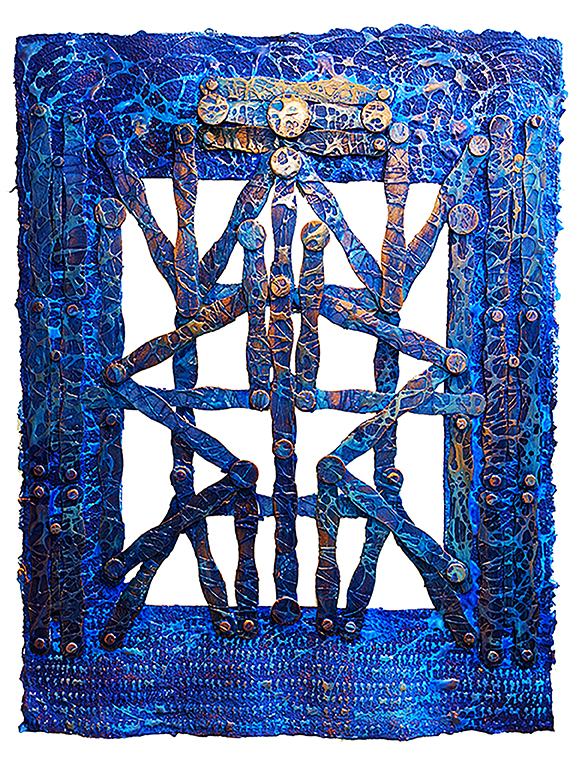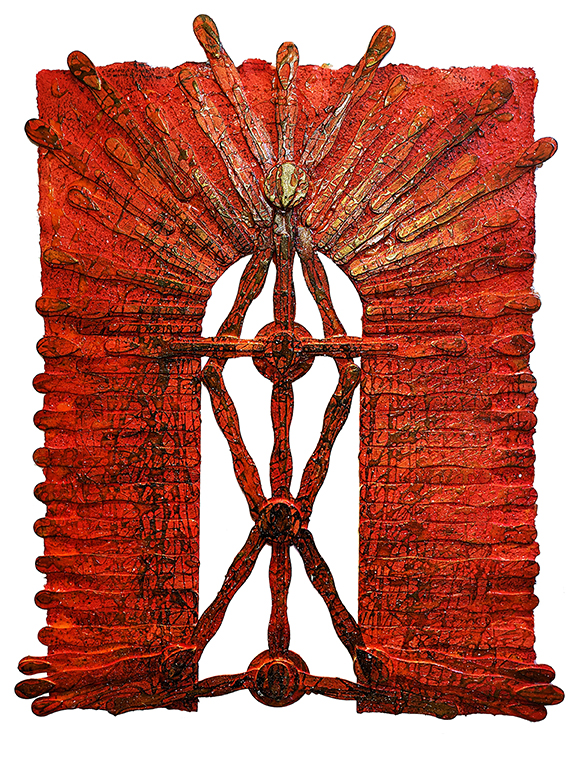FEBRUARY: Human Dignity

The Gateway to Eternal Souls IX: Blue Fields of Reeds (2020)
Mixed Media on Handmade Paper 22” x 30”
The Gateway to Eternal Souls VIII: Orange Fields of Reeds (2020)
Mixed Media on Handmade Paper 22” x 32”
By Gary Grant
The Gateway to Eternal Souls

Curator’s Note
by Gal Cohen
“The Gateway to Eternal Souls” Series started with the rise of the pandemic. Grant, like too many Americans, suffered the loss of family members due to COVID-19. The series of work is an artistic tribute to people struggling with the disease, with no family members around them for support and care. Grant created a “gateway or heaven’s gate” for families who had to deal with this tragic crisis, with “the hope that the artwork will bring peace and dignity to the sick and their loved ones dealing with the virus.” With the advent of social distancing, the pandemic has forced us to become more distant from each other. While of clear benefit for health and safety, the pandemic has forced whole segments of our society to become increasingly absent from public view. How do we ensure human dignity for those both visible and hidden?
About the Artist
Garry Grant is a visual artist based in New York City. With a focus on abstraction, his work is inspired by the materials he employs and the use of color and texture. The tone of Grant’s work conveys a sense of rhythm; the forms expressive movement. A master gilder, he uses gold, silver, and copper leaf for the underpinning of his large-scale works, building these variegated metals onto the canvas to create vibrancy and varying degrees of depth to the background. He often adds pressure to the canvas to bring about a cracked-pattern effect, adding a rich texture to the composition. For the foreground, he applies acrylic paint and other pigments to the canvas by hand, manipulating the material until attenuated forms cover the surface. More recently, his practice has expanded to include the creation of life-size sculptures, other three-dimensional objects, and works on hand-made paper. Grant’s work is held in private collections and has been featured in solo and group exhibitions in New York, Detroit, Dallas, and Atlanta.
Human Dignity
By Rabbi Ari Perten, Norman E. Alexander Center for Jewish Life Director
On December 10, 1948, the United Nations General Assembly ratified General Assembly Resolution 217 A, the Universal Declaration of Human Rights. The declaration asserts, “[R]ecognition of the inherent dignity of all members of the human family is the foundation of freedom, justice, and peace in the world.” The declaration of human dignity as an inherent quality of the human condition is critical as it insists that regardless of appearance, beliefs, or ancestry, all humans are afforded the same rights and considerations. Yet sadly, far too frequently, many are denied their human dignity. How does this degradation occur? Often loss of human dignity does not begin with large-scale attacks and assaults, but rather more insidiously, with an intentional shift of language. To the Nazis, Jews became rats and vermin. To the Hutus the Tutsis became cockroaches. The subversive move to radically reorient the way in which “the other” is described, removing humanity in exchange for more debased connections is exceptionally frightening.
Chillingly, it is not only “villains” who ignore the basic human dignity afforded all people. The 19th/20th Century philosopher Martin Buber described the world as a combination of two types of relationships — I/Thou relationships and I/It relationships. An I/Thou relationship is one in which the I does not objectify a Thou but rather acknowledges a living relationship. I/Thou asserts a connection, bonding two discrete entities together, even if just for a moment. The more common relationship is an I/It relationship. Here, the I and the It remain separate. The It functionally serves the I as a tool existing to be used rather than engaged.
In our own quest for self-improvement, the challenging question to consider is how regularly do I acknowledge the human dignity, not just of my colleagues, friends, and family, but also of the stranger we pass on the street.

